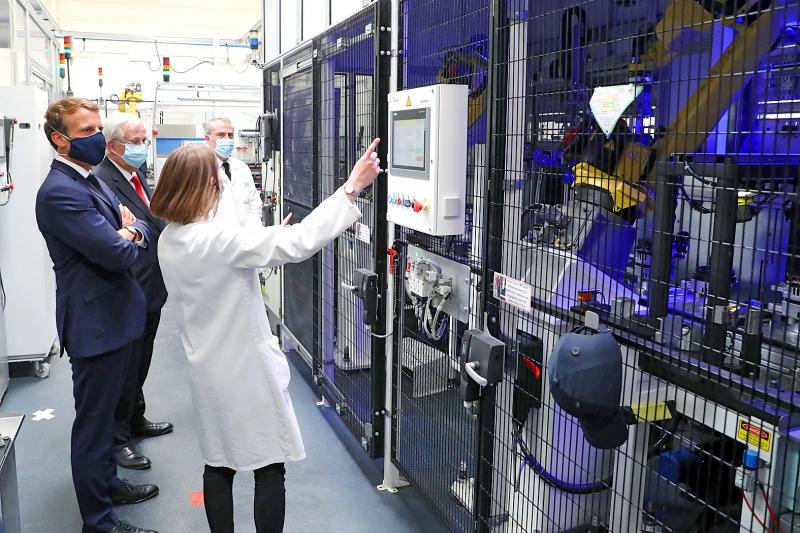The French government is injecting more than 8 billion euros (US$8.8 billion) to save the auto industry from huge losses wrought by COVID-19 lockdowns, and wants to use the crisis to make the nation the No. 1 producer of electric vehicles in Europe.
Starting next week, consumers can get up to 12,000 euros from the government for buying an electric car under the “historic” plan unveiled on Tuesday by French President Emmanuel Macron.
“Our country wouldn’t be the same without its great brands — Renault, Peugeot, Citroen,” Macron said, decrying an “unprecedented crisis” for the industry that has seen production plunge more than 90 percent in France alone.

Photo: EPA-EFE
The 8 billion euro plan includes a 5 billion euro French government loan guarantee under discussion for struggling French automaker Renault SA, but not the millions the government has already spent on temporary unemployment payments to auto workers told to stay home for weeks to keep the virus at bay.
The new plan includes government subsidies to encourage consumers to scrap their old cars and buy lower-emissions models, and longer-term investment in innovative technology.
Macron set a goal of producing 1 million electric cars in France by 2025.
“Our country should embody this avant-garde,” he said. “We need not only to save [the industry], but transform it.”
Macron’s plan appears ambitious. Battery-powered cars are still only a fraction of auto sales in Europe, though manufacturers are focusing on them to meet the EU’s carbon emissions targets.
The biggest European manufacturer of battery-powered and plug-in hybrid vehicles is Germany’s BMW AG, followed closely by Renault, but US-based Tesla sells more than either, according to trade magazine EV Volumes.
The French auto industry employs 400,000 people and is a big part of its manufacturing sector, but shuttered showrooms and suspended production as the virus swept across the nation in March
France country started easing restrictions on May 11.
US automakers have not received direct government help yet, but auto dealers and suppliers can apply for low-interest loans. Some US some politicians do not want to bail out automakers again after they got huge bailouts after the 2008 financial crisis.
In Germany, automakers are pressing for purchase incentives to support major employers and prevent layoffs.
The idea is opposed by some legislators in German Chancellor Angela Merkel’s conservative party and by an expert council of economists, who advised tax breaks and lower energy costs for all companies instead of singling out one industry for help.
A decision on the issue could come as early as next week.
Italian-American Fiat Chrysler, which has its corporate headquarters in the Netherlands and its financial base in Britain, this month confirmed a request for an Italian state-backed loan of 6.3 billion euros.
The move set off debate in Italy over whether such money should be made available to companies with legal headquarters overseas.
The British government is considering bailing out companies whose demise would disproportionately affect the economy, on a “last resort basis.”
The Financial Times on Sunday reported that Jaguar Land Rover Automotive PLC was among those approaching the government to acquire stakes as part of a broader manufacturing bailout.
The McLaren Group on Tuesday said it would cut 1,200 jobs — a quarter of its workforce.

Among the rows of vibrators, rubber torsos and leather harnesses at a Chinese sex toys exhibition in Shanghai this weekend, the beginnings of an artificial intelligence (AI)-driven shift in the industry quietly pulsed. China manufactures about 70 percent of the world’s sex toys, most of it the “hardware” on display at the fair — whether that be technicolor tentacled dildos or hyper-realistic personalized silicone dolls. Yet smart toys have been rising in popularity for some time. Many major European and US brands already offer tech-enhanced products that can enable long-distance love, monitor well-being and even bring people one step closer to

Malaysia’s leader yesterday announced plans to build a massive semiconductor design park, aiming to boost the Southeast Asian nation’s role in the global chip industry. A prominent player in the semiconductor industry for decades, Malaysia accounts for an estimated 13 percent of global back-end manufacturing, according to German tech giant Bosch. Now it wants to go beyond production and emerge as a chip design powerhouse too, Malaysian Prime Minister Anwar Ibrahim said. “I am pleased to announce the largest IC (integrated circuit) Design Park in Southeast Asia, that will house world-class anchor tenants and collaborate with global companies such as Arm [Holdings PLC],”

Sales in the retail, and food and beverage sectors last month continued to rise, increasing 0.7 percent and 13.6 percent respectively from a year earlier, setting record highs for the month of March, the Ministry of Economic Affairs said yesterday. Sales in the wholesale sector also grew last month by 4.6 annually, mainly due to the business opportunities for emerging applications related to artificial intelligence (AI) and high-performance computing technologies, the ministry said in a report. The ministry forecast that retail, and food and beverage sales this month would retain their growth momentum as the former would benefit from Tomb Sweeping Day

Thousands of parents in Singapore are furious after a Cordlife Group Ltd (康盛人生集團), a major operator of cord blood banks in Asia, irreparably damaged their children’s samples through improper handling, with some now pursuing legal action. The ongoing case, one of the worst to hit the largely untested industry, has renewed concerns over companies marketing themselves to anxious parents with mostly unproven assurances. This has implications across the region, given Cordlife’s operations in Hong Kong, Macau, Indonesia, the Philippines and India. The parents paid for years to have their infants’ cord blood stored, with the understanding that the stem cells they contained